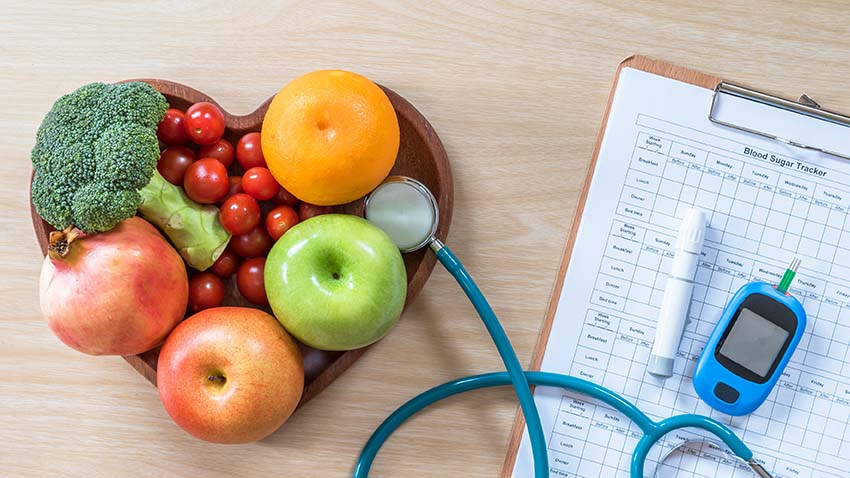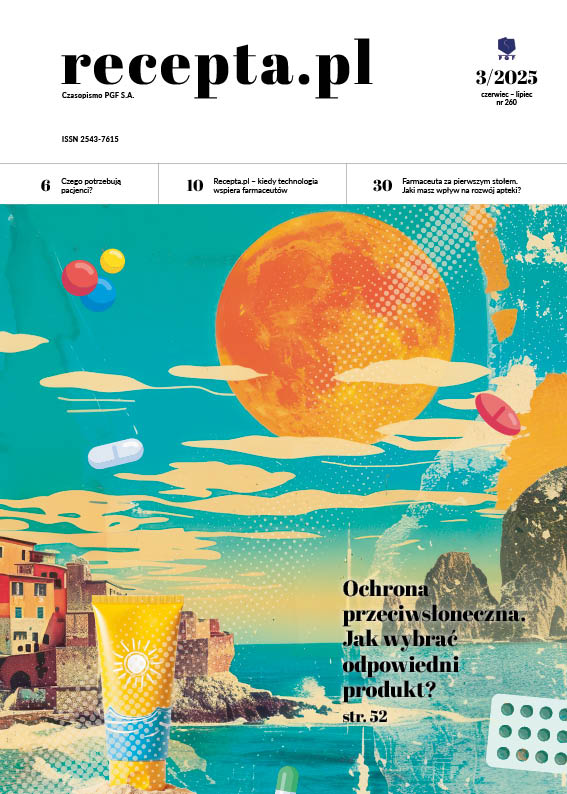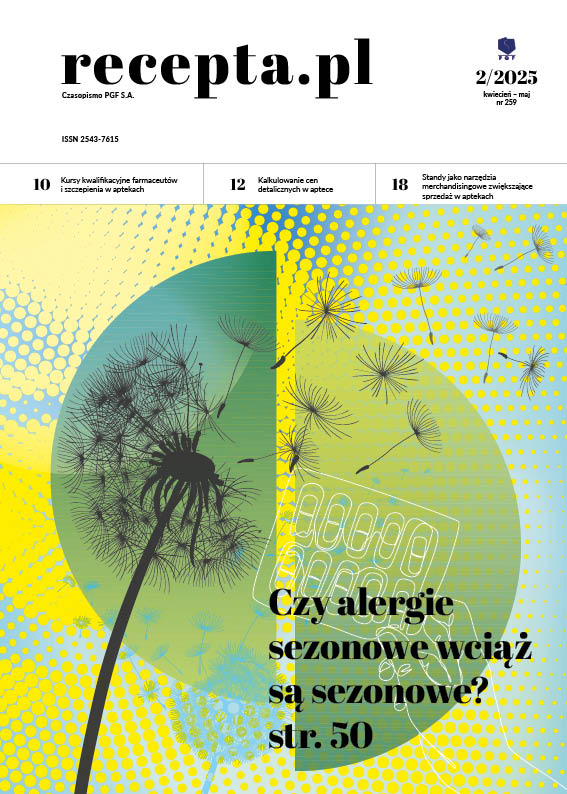
Body Immunity in Autumn
Materiał jest skróconą wersją artykułu mgr farm. Izabeli Ośródki „Jesienna odporność organizmu”, który ukazał się w poprzednim numerze. Przeczytasz go tutaj.
The autumn and winter period is a time when we are prone to catching colds and is sometimes the cause of more frequent respiratory infections. In order to protect ourselves against them, it is worth ensuring that our immune system is in a good condition. A balanced diet rich in vitamins and trace elements, regular physical activity and optimum amount of sleep are very important elements in combating the midwinter.
The immune system plays one of the most important functions, namely the protection of the body from attack by pathogens. Its effectiveness comes from the ability to recognise its own and extraneous factors, to learn and to remember. The human immune system's structures are formed already in foetal life and become fully functional after puberty. The elements that comprise the human immune system include:
- the bone marrow (B lymphocytes development starts there),
- the thymus (T lymphocytes development and selection),
- the spleen (blood antigen recognition),
- the lymph glands (lymphatic antigen recognition),
- the lymphatic tissues (associated with the mucous membranes of the skin, the digestive tract, nose and bronchi).
How does the immune system work?
The exposure of the body to a pathogen triggers a complex immune system response, which includes non-specific and specific mechanisms. Non-specific (or innate) immunity is the body's so called first line of defence against infections caused by environmental factors. It is activated independently of earlier contact with the pathoge nic agent. Its response is rapid and effective, albeit not precise. Mast cells, macrophages, NK cells, monocytes and granulocytes, as well as, a number of protein-like compounds (e.g. lactoferrin, defensins) are all involved in non-specific immunity mechanisms.
In turn, specific (a.k.a. acquired) immunity is characterised by precision and selectivity due to its ability to produce immunological memory upon the first encounter with a pathogen. This repeated contact with a specific antigen induces an immune response. Specific immunity can be cellular or humoral in nature. The cell-mediated type of immunity serves to defend the organism against infections caused by microorganisms present in the body. It exists thanks to the activity of cytotoxic T cells (leading to pathogen apoptosis), as well as, helper and regulatory T cells (inducing cytokine secretion). Humoral immunity, on the other hand, results from the activity of the B lymphocytes and the antibodies they produce, which, upon binding with an antigen, lead to its neutralisation and elimination from the body.
Preparations supporting the immune system
The autumn period is a time when the incidence of colds and respiratory infections increases significantly. This is due to a lower consumption of fruit and vegetables compared to the summer period, which results in a reduction of precious vitamins and antioxidants in the body. With the onset of the autumn season, patients turn to pharmacies for immune support products, with the aim of supplementing the diet with deficient components that can have a positive effect on the immune system. According to research, up to 41% of Poles turn to preparations of this type, and among the active ingredients, the most commonly mentioned ones are vitamin C, D3, zinc, garlic extract, fish oil and shark liver oil.
Vitamin C
Vitamin C, also known as ascorbic acid, is a glucose derivative with strong reductive (antioxidant) properties. Linus Pauling began researching its role in the human body in the 1970s. He observed that administration of vitamin C in large doses significantly shortens the duration of an infection and alleviates its course. But despite years of clinical research, its specific mechanism has still not been identified. The beneficial effect of vitamin C, most likely comes from its pleiotropic function on human beings.
Vitamin C plays a distinctive role for neutrophils (neutrophilic granulocytes), which are a part of non-specific immunity. When stimulated, several oxidative compounds - primarily reactive forms of oxygen - are released. These compounds destroy pathogens, but are also harmful to the cells of the human body, including neutrophils themselves, and can thus impair he functions of the immune system. As a powerful antioxidant, vitamin C neutralises free radicals, thus protecting both neutrophils and the entire body from oxidative stress. Additionally, it has an immunostimulatory effect by stimulating T-lymphocyte proliferation and increasing cytokine secretion.
The human body does not have the capability to synthesise vitamin C, therefore it is essential to obtain it from food. Acerola and rosehip, peppers, strawberries, blackcurrants, parsley, as well as, citrus fruits are a rich source of the vitamin. The alternative is to take oral preparations containing vitamin C. It has been proven that their long-term use significantly shortens the duration of the infection and reduces the risk of subsequent infections. To support immunity, an intake of 1000-2000 mg of vitamin C per day is recommended. High dose ascorbic acid therapy has been found to be safe, contrary to the popular claim that it can increase the risk of kidney stones. Excess vitamin C is eliminated through urine and diarrhoea is believed to be the only symptom of overdose. In order to avoid diarrhoea and ensure adequate absorption of vitamin C, it is advisable to use prolonged release preparations.
Vitamin D3
Vitamin D3 is a steroid-like compound which is formed in the skin under the influence of UVB radiation. Once transported to the liver, it undergoes enzymatic transformation to its active form, 1α,25-dihydroxycholecalciferol (calcitriol, 1,25(OH)2D3). Until recently, this compound was thought to have a function mostly in calcium homeostasis and bone metabolism. However, attention is now turning to its much greater role in the proper functioning of the body – this is confirmed by the fact that VDR receptors, which are affected by 1,25(OH)2D3, are present in almost all human cells.
Research findings of the past three decades have proven that vitamin D3 plays a significant role in regulating the functioning of the immune system. It has been found that VDR receptors show distinctive expression in immune cells such as T and B lymphocytes, monocytes and antigen-presenting cells, i.e. macrophages and dendritic cells. Additionally, these cells possess enzymes which are capable of locally activating vitamin D3 to 1,25(OH)2D3. The role of the vitamin is to modulate immune processes such as the activation and proliferation of lymphocytes, the differentiation of Th lymphocytes and the production of antibodies and antimicrobial peptides. The active form of vitamin D3 also serves as a negative signal for the production of cytokines by macrophages, therefore weakening the enhanced immune response and can reduce the risk of autoimmune diseases.
Solar synthesis accounts for more than 80% of vitamin D3 in humans. The remaining amount is supplemented through food, primarily in the form of fish oils and marine fish (herring, mackerel, salmon), meat, offal and dairy products. The reduced solar synthesis of vitamin D3 during the autumn period and the low intake of fish make vitamin D3 deficiency a common phenomenon among the population.
There are many research findings which suggest, that for various reasons, populations exposed to vitamin D3 deficiency are more susceptible to infections. Because of this, supplementation of this vitamin is recommended between September and April, although a year-round supplementation is recommended in the event of low exposure to sunlight (especially in people who stay mainly indoors and young children). In order to decide on an appropriate dose of vitamin D3, it is worth assessing the extent of vitamin D3 deficiency by determining the level of calcidiol (25OHD3) in the blood (recommended level 30-50 ng/ml). It has been proven that pharmacological doses of vitamin D3 are an effective measure in preventing and treating infections.







